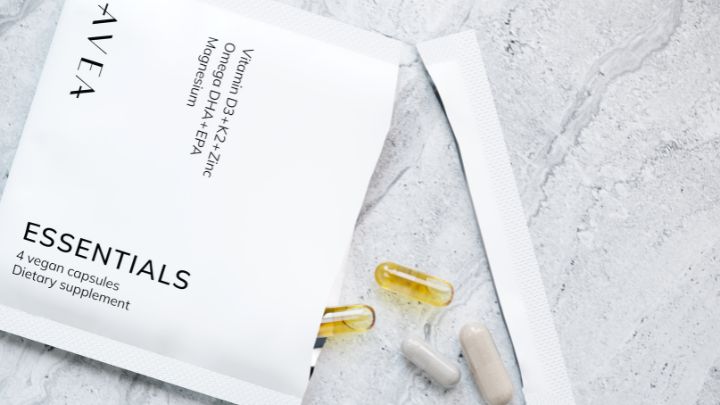Could your mood swings be tied to your hormones? What if the secret to feeling energised lies in understanding these chemical messengers?
Hormones are powerful; they control everything from your stress levels to your hunger signals. But, keeping them in balance is a delicate art. Factors like stress, diet, sleep, and even the supplements you choose can tip the scales.

Did you know that hormonal imbalances can lead to conditions as varied as polycystic ovary syndrome (PCOS), affecting an estimated 8–13% of reproductive-aged women? Up to 70% of affected women remain undiagnosed worldwide.
Scientific studies highlight the delicate balance of women’s hormonal health and its profound effect on their lives.
PCOS is just one example of how a slight shift in hormonal levels can have wide-ranging consequences, from menstrual irregularities to long-term health challenges like diabetes and heart disease.
Recognising the signs and understanding the impact of hormones on your health is crucial for prevention, treatment, and maintaining of your overall well-being. Read on!
In this article
Free guide to reverse your biological age

- Master the science of rejuvenation.
- Apply proven tips to turn back the clock.
- Transform your health with top longevity specialists.
Understanding hormonal imbalance
Hormonal imbalance occurs when there is too much or too little of a hormone in your bloodstream. Due to their highly critical role, even small hormonal imbalances can cause side effects throughout your body. Why?
Because hormones are almost everywhere. They are involved in regulating different functions across the body, meaning that imbalances can affect a wide range of systems. These imbalances can be temporary or indicate an underlying health issue.
But first things first, what even are hormones, and why are they so important?
What are hormones?
Hormones are vital to every aspect of your health and well-being. They are usually produced by your endocrine glands, such as the pituitary, thyroid, adrenals, and ovaries.

These powerful chemical messengers are secreted directly into your blood, which carries them to organs and tissues to regulate the functions of your body.
They are responsible for controlling major processes, including growth and development, metabolism, sexual function, reproduction, and mood regulation.
Hormones are like your body’s communication system, sending messages that help your body function as a cohesive unit, ensuring that internal processes run smoothly and efficiently.
The role of key hormones in the body
Key hormones such as insulin, cortisol, thyroid hormones, estrogen, and testosterone are important for your body’s proper functioning. An imbalance in any of these hormones can disrupt functions in your body and lead to health issues.
1. Insulin
Insulin, a crucial hormone for glucose metabolism, is produced in the pancreas. It enables your body’s cells to utilise glucose as energy, thus maintaining stable blood sugar levels. When insulin function is disrupted, it can lead to conditions such as diabetes, underscoring the importance of this hormone in energy regulation and overall metabolic health.
2. Cortisol
Cortisol, known as the stress hormone, is produced in the adrenal glands located above the kidneys. It plays a key role in regulating metabolism, reducing inflammation, and aiding memory formulation. However, elevated cortisol levels can result in weight gain, high blood pressure, and sleep disturbances, highlighting the need for stress management to maintain hormonal balance and health.
3. Thyroid hormones
Thyroid hormones, critical for regulating metabolism, are produced in the thyroid gland located in the neck. These hormones significantly influence weight, energy levels, and body temperature. An imbalance in thyroid hormones can lead to metabolic disorders such as hypothyroidism or hyperthyroidism, affecting overall well-being and energy management.
4. Sex hormones
Estrogen and testosterone, while primarily associated with reproductive health, are produced in the ovaries and testes, respectively. They also have significant roles in bone density, muscle strength, mood, and libido. Imbalances in these hormones can affect not just reproductive health but also a wide range of bodily functions, emphasising the complexity of hormonal impact on health.
To make things worse, hormonal imbalances can increase the risk of cardiovascular disease, osteoporosis, and certain types of cancer.
Recognising the signs of hormonal imbalance and seeking appropriate medical advice can help manage these conditions effectively, ensuring a better quality of life.
Common signs of hormonal imbalance
The signs of hormonal imbalance in women can be diverse and impact various aspects of health and well-being. Symptoms can range from mild to severe and often depend on which hormones are out of balance.
Common signs include:
- persistent weight gain or loss
- fatigue
- muscle weakness, aches, tenderness, stiffness
- changes in heart rate
- irregular menstrual cycles
- difficulty sleeping
- changes in appetite or sex drive
- sweating
- increased sensitivity to cold or heat
- frequent urination
- increased thirst
- depression
- blurred vision
- dry skin
- puffy or rounded face
Having one or more of these symptoms does not necessarily indicate a definite hormonal imbalance. So it’s always better to check with a professional doctor.
More pronounced symptoms can lead to conditions such as PCOS, endometriosis, and menopause symptoms like hot flashes and mood swings.
Seek appropriate medical advice and treatment, if you experience these too frequently.
Causes of hormonal imbalance
Hormonal imbalances in women can result from a multitude of factors, each affecting your body’s hormonal equilibrium in unique ways.
Common causes include lifestyle factors such as stress, poor diet, and inadequate sleep, which can all disrupt hormonal balance. A vicious cycle is formed.
- Stress elevates cortisol levels, affecting other hormones.
- Dietary choices impact insulin and other hormones.
- Sleep affects the regulation of growth hormone and cortisol.
- Medical conditions like PCOS, thyroid disorders, and diabetes play significant roles in hormonal imbalances.
- Genetics also contribute, with some people more predisposed to certain hormonal conditions.
- Environmental toxins, including endocrine disruptors found in plastics and personal care products, can mimic or interfere with hormone functions.

Your scented candles might be a silent way of you disrupting your own hormones. The synthetic fragrances that are used in making candle scents usually contain phthalates. As the candles burn, phthalates are released into the air and can be inhaled or absorbed through the skin. When the phthalates enter the bloodstream, they can exacerbate allergic symptoms and asthma and alter hormone levels.
Some hormone levels fluctuate throughout life and may occur due to ageing, although other changes occur when endocrine glands are not functioning properly.
Adopting natural approaches to support hormonal health can lead to significant improvements in your overall well-being.
Natural ways to support hormonal health
This includes a range of practices from diet and exercise to stress management and sleep quality. By focusing on these areas, you can help ensure your hormones are functioning optimally, which is crucial for maintaining energy levels, a healthy metabolism, and emotional stability.
These practices are accessible and can be integrated into daily life, offering a holistic way to support your body’s natural hormonal balance.
1. Diet and nutrition for hormonal balance
A balanced diet plays a critical role in supporting hormonal health. Foods rich in omega-3 fatty acids, such as fatty fish, and those high in fibre and antioxidants, like leafy greens, nuts, and seeds, can significantly contribute to hormonal balance.
These nutrients support the endocrine system and can help reduce inflammation, which is often linked to hormonal imbalances. Chronic inflammation is one of the 12 hallmarks of ageing.
On the other hand, processed foods, excessive sugars, and certain dairy products might exacerbate hormonal disruptions.
Emphasising whole foods and minimising intake of processed items can help maintain stable hormone levels, supporting overall health and well-being.
2. Importance of sleep and stress management
Quality sleep and effective stress management are essential for hormonal balance. Poor sleep can disrupt the production of cortisol and insulin, leading to imbalances that affect your body’s ability to regulate stress and metabolism.
Implementing good sleep hygiene and finding effective stress-reduction techniques, such as meditation, yoga, or deep-breathing exercises, can help regulate these hormone levels.
By prioritising your sleep and managing stress, you can support your body’s natural rhythms, promoting hormonal health and reducing the risk of imbalance.
Discover 5 easy tips to sleep better at night.
3. Exercise and hormonal health
Regular exercise is beneficial for hormonal health, as it can help regulate insulin levels and enhance insulin sensitivity. Physical activity also supports the balance of other hormones, including increasing endorphins, which can improve mood and reduce stress.
Consistent exercise routines, whether it’s aerobic, resistance training, or flexibility exercises, can have a positive impact on hormonal balance, contributing to reduced risk of chronic diseases, improved metabolism, and better overall health.
Discover the best exercises for longevity, advised by experts.
4. Supplements and herbs for hormonal balance
Incorporating certain supplements and herbs can support hormonal health. Vitamin D and magnesium are essential nutrients that play crucial roles in hormone regulation.

All the ingredients of the Essentials work perfectly together to support overall health. Vitamin D requires cofactors such as Vitamin K2, Zinc, Magnesium and Omega-3 for proper function.
Vitamin K2 helps to direct calcium to bones and teeth, while Zinc supports immune function and Vitamin D receptor activation. Magnesium and Omega-3 are essential to convert D3 into its active form.


Vitamin D deficiency is a modern epidemic, due to limited sun exposure or dietary intake. It has been linked to weakened bones, depression, a malfunctioning immune system, and an increased risk for chronic diseases such as heart disease, diabetes and cancer, asthma, and cognitive impairment.
Adaptogenic herbs, such as Ashwagandha, can also support hormonal balance by helping the body adapt to stress. These natural remedies can complement a healthy lifestyle, helping in the maintenance of hormonal health.
Consult with a healthcare provider before starting any supplement regimen, especially if you have existing health conditions or are taking medications, to ensure these supplements are appropriate for your individual needs.
Conventional treatments
Conventional treatments for hormonal imbalances vary based on the underlying cause, but may include hormone replacement therapy (HRT), medications to alleviate specific symptoms, and lifestyle adjustments.
These treatments aim to restore hormonal balance, relieve symptoms, and address any health issues arising from the imbalance.
A healthcare provider can offer guidance on the most suitable treatment options, considering individual health needs and potential side effects.
The role of Hormone Replacement Therapy (HRT)
Hormone Replacement Therapy (HRT) is often used to manage symptoms of hormonal imbalance, particularly during menopause, by supplementing levels of hormones that have decreased.
While HRT can significantly alleviate symptoms like hot flashes and mood swings, it’s not appropriate for everyone. Decisions regarding HRT should involve careful consideration of its benefits and risks, as well as ongoing monitoring by a healthcare professional.
Fact v.s. Myth on hormonal health
- Myth: Only women need to worry about hormonal imbalances.
Fact: Both men and women can experience hormonal imbalances. Men also have crucial hormones like testosterone that can become unbalanced, affecting their mood, energy, and physical health.
- Myth: Hormonal imbalances are always a sign of a serious health problem.
Fact: While hormonal imbalances can indicate underlying health issues, they are often caused by lifestyle factors and may be managed with lifestyle changes or medical treatment.
- Myth: Eating soy products can lead to hormonal imbalances.
Fact: Soy contains phytoestrogens, which can mimic estrogen in the body, but moderate consumption is generally considered safe and may even offer health benefits. The impact on hormonal balance varies individually.
- Myth: Birth control pills permanently alter your hormone levels.
Fact: Birth control pills do alter hormone levels to prevent pregnancy, but these effects are usually reversible. Hormone levels typically return to their baseline a few months after stopping the pills.
- Myth: Only synthetic medications can treat hormonal imbalances.
Fact: Alongside conventional medications, lifestyle interventions such as diet, exercise, and stress management can significantly impact hormonal health. In some cases, natural supplements and herbs may also support hormonal balance.
- Myth: Hormone replacement therapy (HRT) is unsafe for everyone.
Fact: While HRT carries risks and is not suitable for everyone, it can be a safe and effective treatment for many individuals when carefully monitored by a healthcare professional.
- Myth: If you have a hormonal imbalance, you’ll always feel unwell.
Fact: Symptoms of hormonal imbalances vary widely; some people may experience significant discomfort, while others have subtle or no symptoms, depending on the hormone(s) affected and the level of imbalance.
- Myth: Testosterone supplements are only for men.
Fact: Testosterone plays a crucial role in women’s health as well, and supplements may be prescribed to address specific health concerns under medical supervision.
- Myth: Diet has no impact on hormonal health.
Fact: Diet significantly affects hormonal health. Foods rich in certain nutrients can support hormone balance, while a diet high in processed foods and sugars may contribute to hormonal imbalances.
- Myth: Stress only affects your mental health, not your hormones.
Fact: Stress has a significant impact on hormonal health, particularly by increasing levels of cortisol, which can lead to a cascade of hormonal imbalances affecting various aspects of physical health










